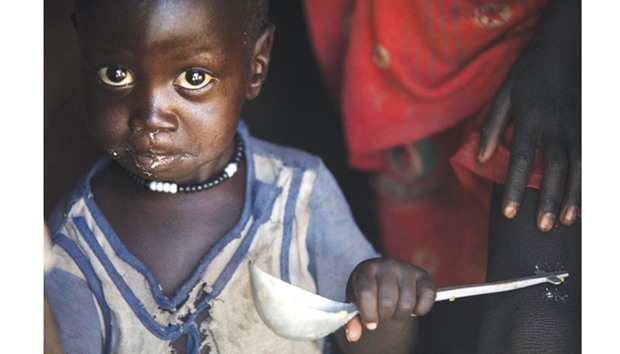Aid workers in South Sudan should be exempt from a 100-fold hike in work permit fees so they can respond to famine in the country, the United Nations said as humanitarian agencies struggle to reach those in need amid fighting and looting.
The world’s youngest nation, which relies on international aid to feed a third of its people, increased fees for foreign “professionals” to $10,000 on March 1.
“We are deeply concerned,” Guiomar Pau Sole, a spokeswoman for the UN Office for the Co-ordination of Humanitarian Affairs (OCHA) said on Monday. “If applied to humanitarian organisations, (it) could mean that generously donated taxpayer money is diverted from the delivery of aid to people in dire need at a particularly critical time.”
The UN is working with the government to request an exemption from the order for aid agencies, she said.
The UN declared last month that parts of South Sudan are experiencing famine, the first time the world has faced such a catastrophe in six years.
Some 5.5mn people, nearly half the population, will not have a reliable source of food by July.
The world’s youngest nation has been mired in civil war since 2013, when President Salva Kiir fired his deputy Riek Machar, sparking a conflict that has increasingly split the country along ethnic lines.
Critics have said the work permit fee increase is aimed at reducing the number of humanitarian workers in South Sudan.
“The increase is not sinister,” South Sudan’s Deputy Information Minister Akol Kordit told the Thomson Reuters Foundation in a phone interview. “It is just an issue of national policy and will not affect (aid agency) operations or their access to areas in need of aid.”
South Sudan increased the fees to match other members of the East African Community, which it joined last year, he said.
Neighbouring East African states charge up to $5,000 for a work permit, according to government websites.
Festus Mogae, a former president of Botswana heading the international commission monitoring South Sudan’s peace deals, will ask the government to reverse its decision today in a speech to government representatives, the UN and donors.
“Increased fees levied on foreign workers directly affect humanitarian workers and will hinder the humanitarian relief effort,” Mogae said by e-mail. “These measures are no doubt aimed at increasing non-oil revenues in foreign currency.”
The currency has plunged and government income has been slashed as conflict has destroyed oil facilities and cut output to less than half its pre-war level of 245,000 barrels per day.
The fee hike will also hinder South Sudan’s development by reducing foreign investment and the transfer of skills, Mogae said.
Six years after independence, South Sudan’s economy is in ruins and inflation is above 800%.
Aid workers have been unable to reach tens of thousands in need for months due to clashes, denial of access at checkpoints and looting of humanitarian compounds, the OCHA said on Friday.
More than 100,000 South Sudanese are experiencing famine, with a further 1mn on the brink of starvation, it said.
International / US/Latin America
Aid workers in famine-hit South Sudan should not pay $10,000 to help: UN

A boy eats out of a ladle at his home in Ngop in South Sudan’s Unity State. The Norwegian Refugee Council (NRC) distributed food (maize, lentils, oil and corn soya blend) for more than 7,100 people in Ngop. South Sudan, the world’s youngest nation formed after splitting from the north in 2011, has declared famine in parts of Unity State, saying 100,000 people face starvation and another million are on the brink of famine.
